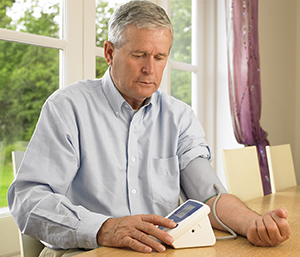High Blood Pressure and Kidney Disease
High Blood Pressure and Kidney Disease
If you have high blood pressure and it is not controlled, it can damage the walls of the blood vessels in your body including those in the kidneys. If that happens, the tiny filtration units, or nephrons, become damaged and less able to filter your blood and waste products in the blood. Lowering high blood pressure can reduce the amount of damage to your kidneys and help slow any progression of kidney disease. High blood pressure is one of the top two causes of kidney failure in Western countries.

The systolic pressure is when your heart is beating and pumping blood. The diastolic pressure is when your heart is relaxing and refilling with blood. A normal blood pressure is less than 120/80. In chronic kidney disease, or CKD, the blood pressure goal is less than 130/80.
Check your blood pressure often
Checking your blood pressure is a simple test that you can do at home. Most pharmacies have in-store monitors and home blood pressure monitors. For best results, keep the hints below in mind.
-
Always take your blood pressure at the same time of the day. Morning may be best.
-
Sit so that you feel relaxed, and do not talk.
-
Use the cuff on your bare arm.
-
Place the cuff so it fits snugly on your upper arm. Some monitors are placed on the wrist.
-
Follow all the instructions that come with your kit.
-
Keep a record of all your blood pressure readings.
-
Take your record and kit with you to healthcare provider visits. Ask your healthcare provider to check your blood pressure using your kit, and compare your readings with your providers.
Take medicine as directed
Blood pressure medicines often play a large role in treatment. Your medicine will work best if it’s taken as directed. Be sure to do these things:
-
Take your medicine at the same time each day.
-
Find out if it should be taken with food.
-
Call your healthcare provider if you think the medicine is making you dizzy or sick to your stomach.
-
Do not skip doses.
-
Do not stop taking your medicine unless your healthcare provider tells you to. Doing so may be harmful.
-
Get regular urine and blood tests at least annually to watch for kidney disease or monitor existing kidney disease.
Addressing other risk factors for kidney disease
Many other factors can also contribute to kidney disease. Smoking, diabetes, dietary habits, lack of exercise, obesity, and other factors can contribute.
Updated:
March 15, 2019
Sources:
Up To Date. Overview of Hypertension in Acute and Chronic Kidney Disease
Reviewed By:
Walead Latif MD